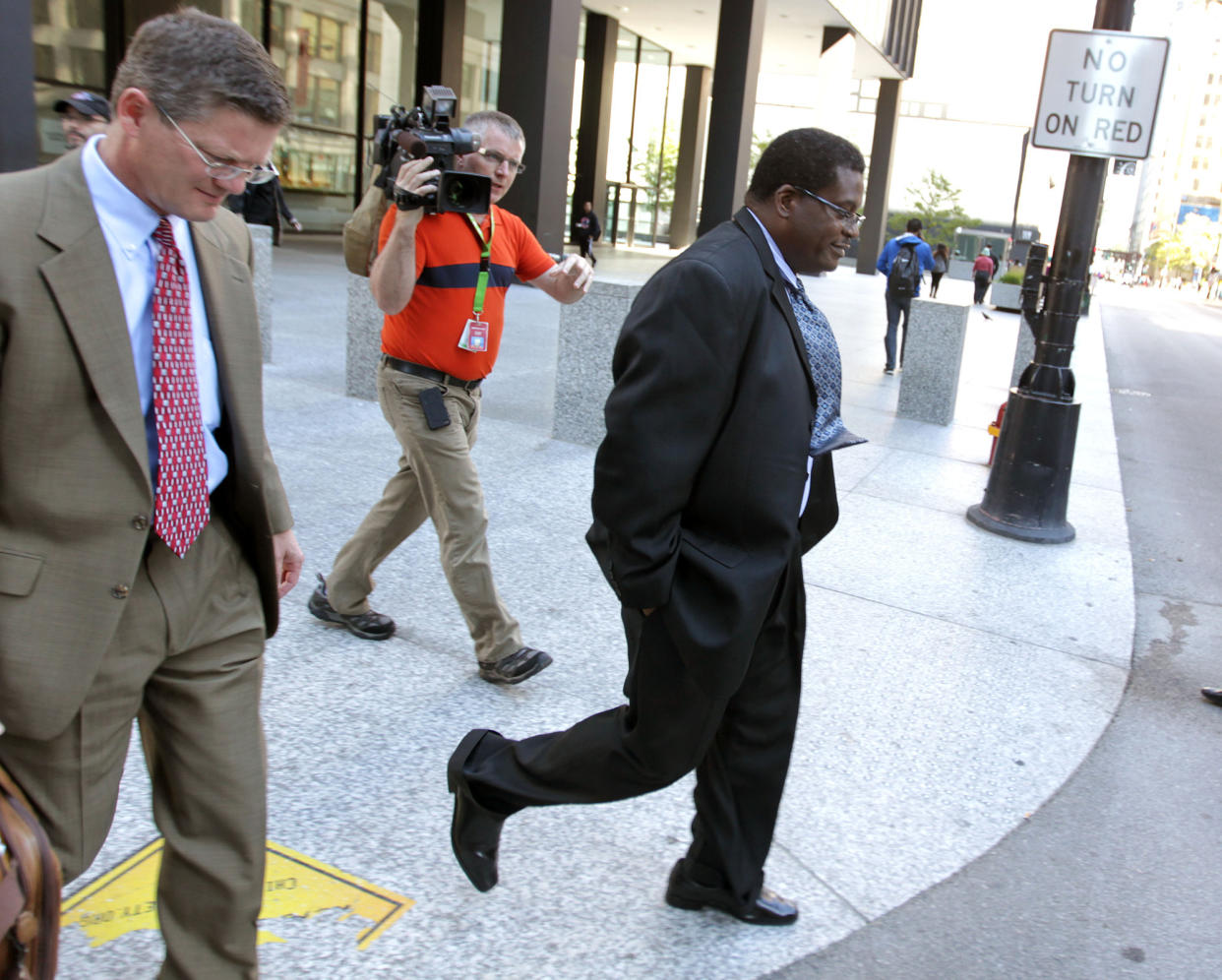Last-minute settlement in lawsuit against corrupt CPD Sgt. Ronald Watts could be a key test for 175 more

- Oops!Something went wrong.Please try again later.
A lawsuit alleging misconduct by notorious ex-Chicago police Sgt. Ronald Watts settled for an undisclosed amount on the eve of trial, records show, the first of scores of related lawsuits to reach a resolution in what could be a massive fallout for the cash-strapped city.
Alvin Waddy alleged in his lawsuit filed in Cook County Circuit Court in 2019 that Watts and his crew of tactical officers pinned a phony drug case on him in 2007 at a building in the the now-demolished Ida B. Wells housing complex on the South Side.
According to the lawsuit, police “came rushing” into the lobby, searched Waddy, and came up empty— then arrested him for drugs they allegedly found at the other end of the hallway.
After more than five years of legal wrangling, including several trial dates that were continued at the last minute the case had finally been set to go before a jury on Monday at the Daley Center, records show.
On Thursday afternoon, however, paperwork was filed indicating the parties had reached a settlement agreement, and the trial was canceled, court records show.
While the amount of the settlement was not disclosed, the court records show it was subject to approval by the City Council, indicating it’s at least a $100,000 payment. The city’s Finance Committee is scheduled to meet next week, so it’s unlikely to be taken up until at least August.
When asked about the Waddy settlement and the prospect of a global resolution to Watts-related cases, a spokeswoman for the city’s Law Department declined to comment, saying the litigation is still pending until the City Council votes on the Waddy deal.
Lawyers for Waddy also had no comment Friday.
Watts was arrested in 2012 along with another member of his team, Officer Kallatt Mohammed, for shaking down a drug courier who turned out to be an FBI informant. Watts received 22 months in prison and was released in 2015.
In the years since, Watts and his tactical officers were accused of orchestrating a reign of terror at Ida B. Wells, systematically forcing residents and drug dealers alike to pay a “protection” tax and putting bogus cases on those who refused.
More than 200 Watts-related convictions have since been thrown out, and there are some 175 pending lawsuits against Watts. Waddy’s lawsuit was filed in Cook County, while the remainder are in Chicago’s federal court. The first trial is scheduled for January.
The amount that the city has agreed to pay Waddy could be an important factor on how the rest of the cases play out in what threatens to be one of the most expensive police misconduct scandals in Chicago police history.
Aside from whatever payments are made to the plaintiffs through settlements or jury awards, the costs to taxpayers are already piling up into the millions because the city is using several outside law firms to handle the litigation.
Records obtained by the Tribune through an open records request show that through April, the city had paid more than $1.2 million to outside counsel in the Waddy case alone, and that figure is likely to have grown significantly as the case neared trial.
In federal court, the cases have been consolidated for discovery purposes since many of the facts and allegations overlap.
The first lawsuits against Watts came in 2016 amid the fallout of the shooting death of Black teen Laquan McDonald by white Chicago police Officer Jason Van Dyke.
The plaintiffs are almost all Black men who lived in the Ida B. Wells complex and were familiar with Watts and his crew. In case after case, the lawsuits allege when Watts’ targets complained — to the Police Department or in court — judges, prosecutors and internal affairs investigators all believed the testimony of Watts and other officers over their accusers, records show.
The cases also highlighted a broken system of police discipline that allegedly protected corrupt officers and punished those who tried to expose his corruption. Despite mounting allegations, Watts continued to operate for years amid a lengthy police internal affairs probe as well as investigations by the state’s attorney’s office and the FBI, according to court records.
In fact, two Chicago police officers who alleged they were blackballed for trying to expose Watts’ corruption years ago won a $2 million settlement in their whistleblower lawsuit.
Watts has denied wrongdoing in every lawsuit. He moved to Las Vegas after his release from federal prison and has kept a low profile. Records show he currently lives in Arizona.
Last year, Watts told a conservative radio host in a lengthy interview that he spent his career disrupting violent drug dealers and is now the victim of a smear campaign by ex-criminals and lawyers trying to cash in.
He’s been deposed several times under oath as part of the lawsuits, but those records remain under seal.

